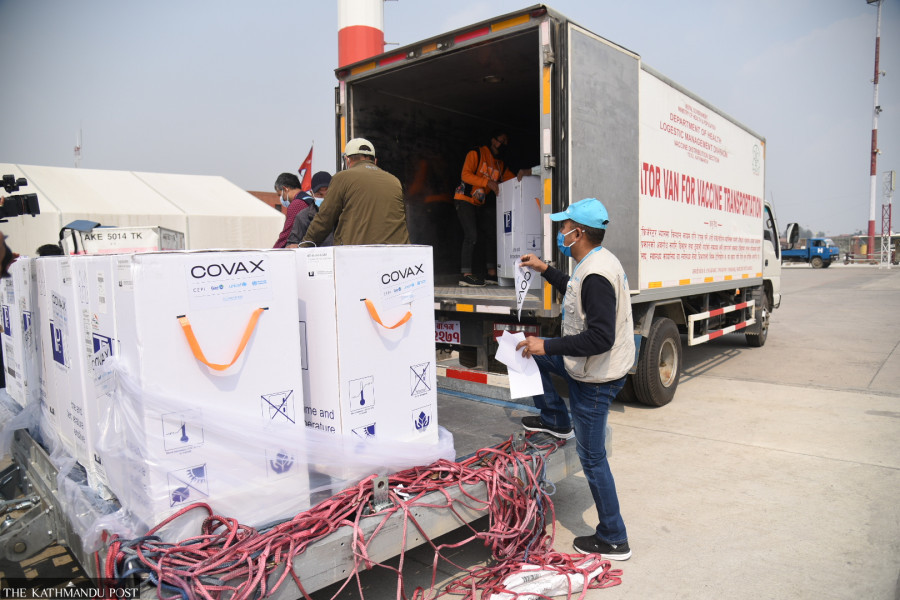Health
Amid low jab uptake, Nepal asks COVAX to delay supply
It costs over Rs75 million to administer 500,000 doses received free of cost, officials say.
Arjun Poudel
Amid the sluggish uptake rate of Covid vaccines in the country, the Ministry of Health and Population has requested the COVAX facility to delay the supply. Officials say that the move of the ministry is aimed at preventing vaccine doses from going to waste.
“New consignment of Covid vaccine will arrive only in July and August,” said Dr Abhiyan Gautam, chief of the Immunisation Section at the Family Welfare Division of the Department of Health Services. “Supply of the vaccine doses has been delayed at our own request, as uptake of the vaccine is too low.”
Due to the inability of the authorities concerned to convince people to get inoculated with booster shots, thousands of doses of coronavirus vaccines had expired in the past.
COVAX facility, the United Nations-backed international vaccine sharing scheme that supplies the coronavirus vaccine to Nepal free of cost, has not supplied the vaccine doses since February. Officials say the facility will supply 100,000 doses of Pfizer-BioNTech vaccine in July and 600,000 doses in August.
Pfizer-BioNTech’s is the only bivalent jab that has got an emergency use approval in Nepal.
The bivalent Covid vaccine includes a component of the original virus strain as well as a part of the Omicron variant to provide a broad protection against Covid.
The vaccine is called bivalent Covid shot as it contains two components—original virus strain and Omicron BA.4 and BA.5 sub-variants. Doctors say a bivalent Covid vaccine may also be referred to as an “updated” Covid vaccine booster dose.
Currently, health authorities have been administering the coronavirus vaccine from a few health facilities in Kathmandu Valley. Officials say only fewer than 100,000 vaccine doses are in stock.
There is no demand for the vaccine, said Gautam.“With the decline in new infection rate, the demand for vaccine doses too has lessened. The declaration a few months ago by the World Health Organisation that Covid no longer constitutes a public health emergency of international concern also negatively affected uptake of the vaccine.”
Infectious disease experts say even if the WHO downgraded the emergency, the virus isn’t going anywhere. They say that the coronavirus has already become endemic and will keep circulating in communities.
“We should not forget that the influenza virus created a pandemic some 100 years ago but still people need a vaccine against it,” said Dr Prabhat Adhikari, an infectious disease expert. “Covid has already become endemic in our country and the risk of new mutation always exists. Those having compromised immunity, elderly people, pregnant women, and people suffering from chronic diseases are at risk of dying if infected with Covid.”
Health ministry officials say that the government will continue the vaccination programme in the coming days as the risk of infection exists in the country.
“The UN health agency has not said vaccination is not needed and risk of infection subsided,” said Gautam. “We are planning to launch awareness to increase the uptake of the coronavirus vaccine.”
The WHO’s vaccine advisory group has recommended additional booster shots in six months after the last shot for some, depending on age and immunity conditions.
Health officials say that huge amounts (millions of rupees) are spent to administer the vaccine doses, even if the government gets them free of cost from the COVAX facility.
People might think that the health authorities have been administering vaccine doses they get free of cost and encouraging people to get vaccinated, again and again, which is partially true, according to officials.
“To administer 500,000 doses, it costs over Rs75 million,” said Gautam. “Maintaining the cold chain at various levels and transporting vaccines, training and mobilisation of human resources, and awareness drives cost huge amounts.” This means even if Nepal receives the vaccine for free, it still has to spend around Rs150 per dose for administration.
All public health measures taken at the time of the pandemic have been removed.
Nepal so far has used Covid vaccines developed by the University of Oxford and the pharmaceutical giant AstraZeneca, manufactured in various countries of Europe, India and Japan, the Chinese Vero Cell, and the US-made Janssen, Moderna, and Pfizer-BioNTech.
So far, 12,031 Covid-related deaths have been reported in Nepal, according to the official count.




 9.83°C Kathmandu
9.83°C Kathmandu















